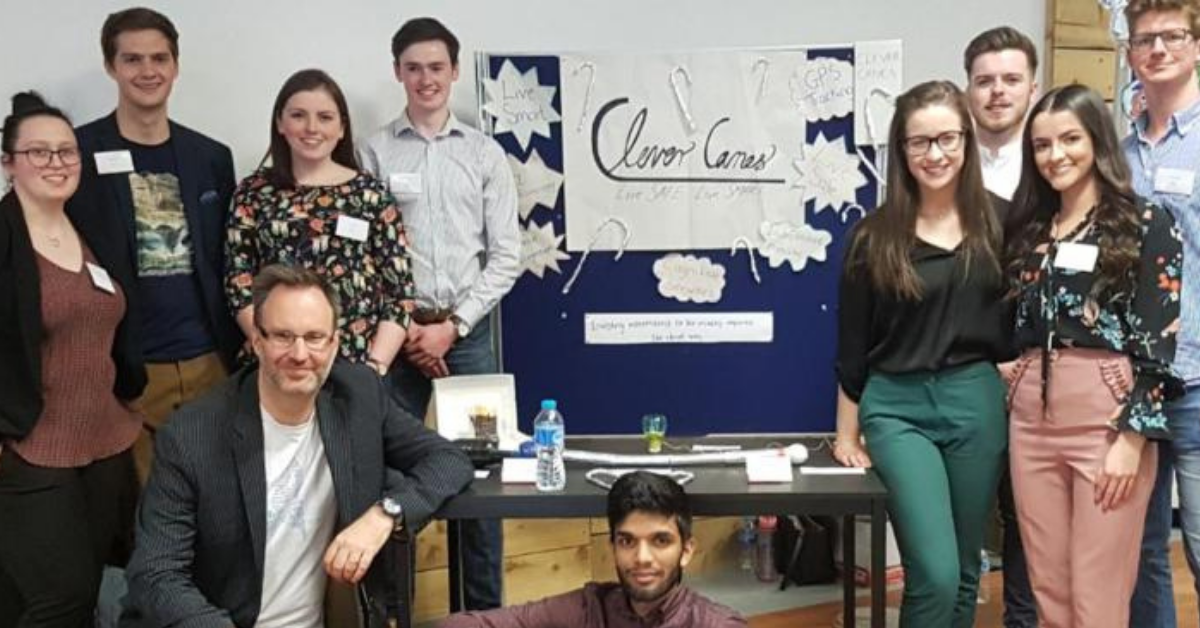How to overcome environmental and personal barriers to let your
creativity flow.
What is creativity? “It’s new and useful ideas in any domain,” says Roisin Macartney, Queen’s Careers Consultant, who adds that there are barriers that limit our own creativity.
“These barriers can be from your own thinking, and from environmental [factors] and the environment that you are in. If you do what you’ve always done, don’t make changes and just accept the status quo, creativity will suffer. Challenge, ask questions, take risks to keep expanding your creative thinking.
So how do we start to open ourselves up to being creative and thinking creatively? Roisin has these top tips:
- Give yourself space
“One of the things I would suggest is starting with a blank page. I think you have to give yourself time to be creative,” says Roisin, who add that this doesn’t necessarily mean scrolling through Instagram or Pinterest. “I don’t mean that you can’t be inspired by other people’s creativity, because you certainly can, but you do have to give your brain a time out, basically.”
She adds: “To be able to generate your own creative ideas, it might be that you take a walk, or you lie in a bath, or you basically stare at a blank page and give yourself the room and the time to be creative.”
2. Challenge the norm
Another way to channel your creativity is to challenge your assumptions. “Always ask yourself if something must be done this way. If it must be this way, how could it be different? So that could be, you know, an assignment that you’ve been given. It could be a work assignment, it could be just something in your everyday life. Does it always have to be done this way? How could you be creative and think differently about it?”
3. Stay curious.
Remember that child that you once were always asking why and driving your parents crazy? It’s time to channel that child and ask why why why! “Try to keep that curiosity alive because it’s not only good for your creativity, it’s also good for your wellbeing. “Don’t lose the art and the joy of playing: rediscover the joy of getting out the Lego, the colouring pencils, or anything else to start playing and getting creative. It’s not about what you create while playing,” says Roisin. Adding, “It’s about letting the mind be creative, so allowing yourself to be open.”
4. Try something new.
“It might be trying a new recipe every week. It might be learning how to use a new function on your software package…. Just keep trying new ways of doing things and that’s you being creative as well,” says Roisin.
5. Get inspired.
While it can be good to have time out on your own to generate new ideas, it can also be good to work with other people, who also want to create, especially if there are particularly creative people that you can work with. “ You can bounce and generate new ideas from each other,” adds Roisin.
6. Flex your creative muscles.
“There are some techniques that can help you to keep stretching that creative muscle. It can be doing something to keep your brain active, like Sudoku or crosswords. Learning a new word every day, perhaps in your own language or in a different language, and what you really want to be doing is helping your brain to make new associations and build those new connections. So, you can encourage your brain to be the sort of brain that makes connections and sees patterns and therefore becomes more creative,” says Roisin.
7. Try mind mapping.
“Start with a central focus, whatever your theme is going to be, you start with that focus. You then put down main themes and coming off that central focus as branches from the center. You might sort of get creative using colour and using pictures and things like that, especially if you’re good at artwork and it can be really nice to do it that way. And you keep adding to it. And in terms of creativity, it’s likely to be the things around the outer edges where the creative thinking comes into it.”
8. Get brainstorming.
You’ll certainly have used brainstorming in the past and the key thing about brainstorming is that all ideas are equal and valid, and they’re not challenged, explains Roisin. “Brainwriting is when people individually write out their ideas first. So, whatever the question or the problem, rather than everybody shouting it out for somebody to write, you all write it out. And then you share those, so everybody’s ideas all go up, and that can spark other ideas. And that can mean that people are not limited by other people’s ideas or louder characters or challenges.”
9. Scamper.
“Scamper is based on the reasoning that everything new is just an addition or a modification of something that already exists. So, this technique gets you thinking about ways that you can build on that idea of change and changing something to create something else,” explains Roisin. “For example, I was writing this last year, but at the time there were some coffee bags being advertised on the TV. And clearly that’s just coffee and tea bags, you know, combined together. And they often sort of do that with things like chocolate bars, you know, Cadbury’s will come out with some new addition to the chocolate, just to make it a little bit more of a novelty to us so that we might want to go and get that and try it out. So, what can we add? Somebody decided to add balm to tissues, for example.” Linked to the Scamper technique is reversal. “Problem reversal is about reversing the problem that you might have. It’s a different way of looking at the challenge. So instead of looking at the challenge in terms of what do you want to do, you reverse it and say what you don’t want to do. For example, say you want your company to sell more pencils. Instead of saying how can we make our pencils better, the reverse thinking might be along the lines of: we want pencils that don’t break as soon as you begin to use them. And of course, that leads you to what you actually want to do to make the pencils better. “
10. The lawbreaker technique.
The lawbreaker rule asks: What do we assume or believe to be true? And what if that were not so? “Lawbreakers are all about challenging those assumptions that we all make, says Roisin. “For example, the burger has to be inside the burger roll. What happens if it isn’t? If we can forget about those assumptions, then what changes would we make? Things like putting the cheese into the crust of our pizza, you know that’s challenging the law of pizza; it’s challenging our idea of what we thought pizza was.
11. The great minds technique.
This involves: what would [insert person] do? “Generally, it should be somebody that you respect and in this regard someone who is creative. So, what would that creative person do with this problem or issue? It can be an actual person, maybe somebody like Greta Thunberg or Marcus Rashford. You know, it doesn’t even have to be a specific person. For example, you might say, well, what would a 7-year-old boy think about this because again, as we know, the younger people are often very creative. So, what would a child think about this? What would you know, a character or like? What would Superman do?
You can access more resources on thinking creatively on our website.













